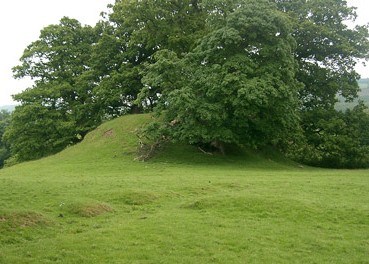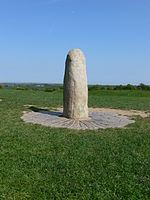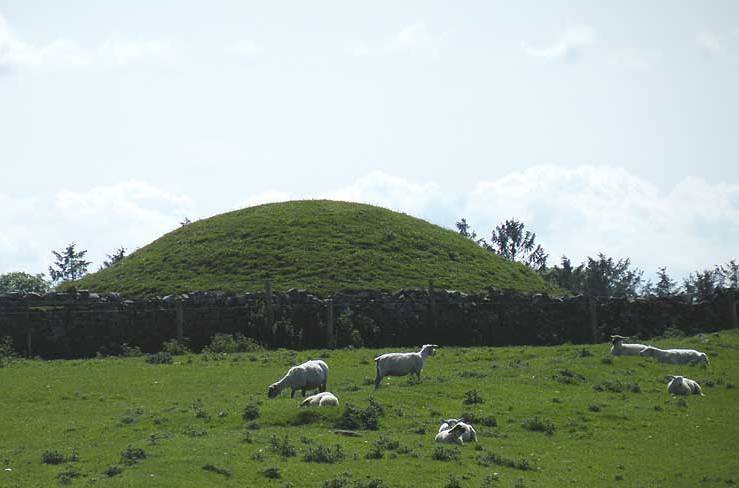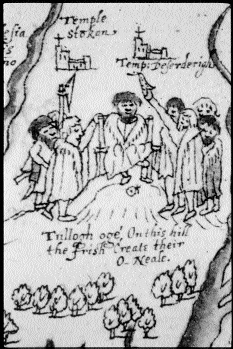As we discussed in Episode 9, Lugh sets eight tasks for Brian and his brothers as an éric for the death of his father, Cian. He demands a series of marvelous items (see “Pleasing the King of Bling” for details). However, the final task is of a very different nature. Lugh cannot gain materially by the success of this quest. It has one purpose only; to bring about the deaths of the sons of Tuirenn.
Lugh asks for three shouts on a hill, but this simple request is deadly. They are to give the shouts on the hill of Miodhchaoin. This warrior and his sons have an implacable feud with Tuirenn and his sons. Miodhchaoin, the guardian of the hill, meets them, and Brian fights with him. The fight is ferocious but, eventually, Miodhchaoin falls. Then the three sons of Miodhchaoin come to fight against the Children of Tuireann.
The sons of Miodhchaoin fall but the children of Tuirenn are badly wounded. His brothers say they cannot rise to give the three shouts. Losing copious amounts of blood, Brian raises his brothers and, with Brian supporting them, they give the three shouts.
They manage to return to Ireland but the tale ends in tragedy, of course, as Lugh refuses to allow them to be healed with the pigskin gained in task two. They all die.
Lugh clearly designs this task as a vengeful act, but has he selected it as a unique and imaginative death sentence, or is the quest reflected as a motif in other stories?
In essence, the task involves undertaking a deliberate action in a significant place, leading to a dangerous or unpredictable outcome.

There is a task undertaken by Pwyll in the first branch of the Mabinogi which has some similar features:
Pwyll arose to walk, and went to the top of a mound that was above the palace, and was called Gorseth Arberth. There was a legend about this mound, that whoever sat apon it, would not leave without either receiving wounds or else seeing a wonder.
Translation by Charlotte Guest
Once upon a time he [i.e. Pwyll] was in Arbeth, a chief court of his, with a feast laid out and great hosts of men all around him. After the first course, Pwyll got up to go for a walk and made for the top of a mound which was above the court and was called Gorsedd Arbeth.
‘Lord’, said one of the court ‘it is a peculiarity of the mound that whatever high-born man might sit upon it, he will not go away without one of two things: either wounds or blows, or his witnessing a marvel.
Translation by Will Parker
Pwyll goes deliberately to a high place to undertake an action that will have dangerous or unpredictable effects. There are differences in that Pwyll chooses this course of action for himself. His actions lead not to his death, but directly to his meeting with Rhiannon and some remarkable otherworld adventures.
Owain, or the Lady of the Fountain is another tale from the Mabinogion with a similar core motif. Owain’s questing leads him to a mound in a forest where he meets with an ill-favoured giant surrounded by animals. He is described as the “Wood-Ward” of the forest. The giant directs Owain to a clearing in the forest where he will find a huge tree. At the foot of this tree is a fountain and a great stone slab. Owain is to take water from the fountain, using a silver bowl attached to the slab by a silver chain, and pour the water on the stone.
This is intended as a challenge to test Owain’s worth. He is warned that what will follow will be a violent storm, stripping the leaves from the tree. Then will come singing of wonderful birds, and lastly he will be challenged by a mounted knight, clothed in black velvet and riding a black horse.
And if thou dost not find trouble in that adventure, thou needest not seek it during the rest of thy life. the woodward tells Owain.
Translation by Charlotte Guest, p 8
It all happens as is foretold. Owain faces the challenge but the task is too great for him and his quest does not succeed.
This “challenge” story is begun on a mound, but now a new element is introduced in the form of a significant stone, in this example, the great marble slab beside the fountain at the foot of the tree. It is the pouring of water on this stone that initiates the testing of Owain.
Stones of destiny and challenge are a familiar feature of Irish story, connected with sovereignty and the recognition and acclamation of regional leaders. Some of these stones may still be encountered in the Irish landscape, and are generally found on mounds or high places.

Probably the best known is the Lia Fáil. The so-called “Stone of Destiny” is to be found on the Inauguration Mound on the hill of Tara. There are a variety of legends and stories about this stone. Certainly the text of the Moytura saga tells how it was one of the four treasures brought from the cities of the north by the Dé Danann when they first came to Ireland. The Lia Fáil was said to cry out when the rightful king put his feet on it. It was also said to be able to rejuvenente the king and grant him a long reign.
The Lia Fáil was not the only inauguration stone in Ireland. Doon Rock in Donegal is a craggy hill used for centuries by the O’Donnells. The stone, no longer in evidence, was said to have had impressions of the feet of the original O’Donnell chieftain on it.

The mound of Carnfree in Roscommon was used for the inauguration of the O’Connor kings of Connacht. This mound is associated with Fráech son of Medb.
Many other such sites have been recorded. Leac na Rí,”the Flagstone of the Kings”, outside Tullyhogue fort, near Cookstown, County Tyrone, was incorporated into a ceremonial stone chair by the 16th century. The Coisleach Aonghuis (lit. “Foot-slab of Aongus”), near Warrenpoint in County Down, is also known as the Coronation Stone of the Clan Magennis.

It is significant that the “crowning” stones are generally located in high places. The Lia Fáil also retains, in legend, the weight of destiny apparent in the “challenge” stories found in the Mabinogion and the Children of Tuirenn.
There may be another connection in the medieval versions of the Arthurian cycle. According to the stories, Arthur always gathered all his knights at the round table for a feast at Pentecost:
So ever the king had a custom that at the feast of Pentecost in especial, afore other feasts in the year, he would not go that day to meat until he had heard or seen of a great marvel.
This is reminiscent of Pwyll’s visit to the hill of Arberth although it seems that the Round Table has taken over the role of the mound.
Even more significant is the seat created, at the same table, by Merlin. This is the “Seige Perilous”. This seat is kept vacant, ready for the knight who will succeed in the quest for the Holy Grail. It is supposed to be fatal to any other knight who dares to sit in it. For example, the less than perfect Sir Moys is hurled into the abyss. The Seige Perilous is first referenced in Robert de Boron’s “Romanz de l’Estoire dou Graal”. It is now a familiar part of the Grail cannon.
The motif of the Seige Perilous may well have an alternative source. In Robert de Boron’s story, the seat is connected with the journey of Joseph of Arimathea and his companions. The Round Table recalls the table of the Last Supper and the dangerous and, to the wrong person, unlucky seat is the chair of Judas. However, all memorable stories are richly multi-layered accruing new relevance as their audiences’ viewpoint changes.
So what do we have?
The quest for the ‘three shouts on a hill’, demanded by Lugh as part of the honour-payment for his father, is certainly a vindictive final blow aimed at the brothers. If the other tasks do not cost them their lives then this last one will. As we discussed in the podcast episode, this quest breaks the spirit of the honour fine system. Lugh expects the éric but still exacts a death sentence.
itt maybe that Lugh knew what he was doing. One element that all the other stories referenced above have in common is the testing of the questor. He must be proved worthy of his destiny. Even Pwyll is tested. He spends a year in Annwvyn before he can win Rhiannon.
In killing Cian, Brian and his brothers are guilty of an unworthy act. When they arrive at the hill of danger and unpredictability, meeting the challenge, they have no chance of eventual survival.
As for Brian, being Brian, he is not easily defeated and he shouts, loudly!
March ’13
